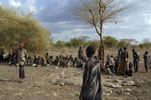
South Sudan was once again hit with violence this week when Lou Nuer militiamen attacked a Dinka village, leaving 76 dead, 46 injured and 1,800 homeless, according to officials cited by the L.A. Times. Among those dead were 20 government security officers who were defending the village.
The particulars of this attack fit the pattern of the recent wave of violence in South Sudan. Clashes have rocked the region with instability for several months, taking more than 2,000 lives and displacing 250,000. Observers, including U.N. Special Rapporteur for Human Rights in Sudan Sima Samar, have noted the presence of new and modern weapons and the targeting of women and children in this wave of violence—characteristics that distinguish these attacks from traditional cattle raiding.
Said Jonglei Governor Kuol Manyang of Monday’s attack, “Though they [attackers] could be termed as civilians, they had military formation; had uniform and carry new brand of G3 (Gimp three)."
The forces behind the killings remain a mystery, with northern and southern Sudanese governments pointing fingers at each other. The southern government is convinced that Khartoum is arming militias as a way of creating instability and undermining the upcoming referendum for southern secession. Major General Kuol Diem Kuol said of the attack, "It is not normal, it is something politicized and the National Congress Party wants to destabilize southern Sudan, particularly with the approach of the elections." A representative with the North’s ruling National Congress Party said that the attacks demonstrate the SPLM’s failure to provide security to its citizens. Regardless of the source of the violence, these episodes do expose the limited capability of the southern forces to secure the region.
Indeed, the source of violence may also come from within the ranks of the SPLM, motivated by ethnic and political rivalries within the party. This is the third incidence of violence in a month’s time that involved Lou-Nuer tribesmen attacking the Dinka tribe. In late August, 46 Dinkas were killed in Wernyol; in early September, 24 were killed in the village of Pigwrithiang.
United Nations Secretary General Ban Ki-moon has expressed concern over the violence, encouraging the government of South Sudan to “redouble its efforts” to protect its civilians. U.N. Regional Coordinator for Southern Sudan David Gressly said that the Monday attacks were not related to cattle raids, but did not say who may be behind the violence. "It seems to be different. Cattle were not there. It was more targeting," he said.
The South’s minister of interior affairs said today that more troops have been sent to Jonglei State. “[W]e are committed and determined to providing adequate security to the whole region and more especially to the frequently affected areas by tribal conflicts," he said.
With attacks unrelenting and the pattern of fighting reminiscent of the North-South civil war, the U.S. must be realistic about the likelihood that parties to the Comprehensive Peace Agreement – the very same who continue to rhetorically pledge their dedication to implementing the peace deal – are working behind the scenes to undermine peace. The longer it takes for the Obama administration to recognize these patterns, the closer Sudan gets to the resumption of full-scale civil war.
Photo: Displaced people who are part of the Murle tribe await U.N. aid after being displaced by attacks. (AP/UNAMIS handout)

